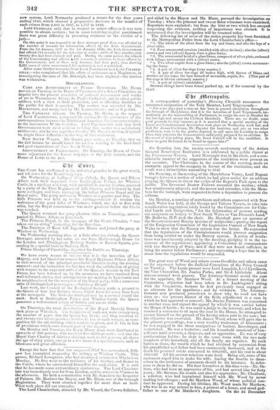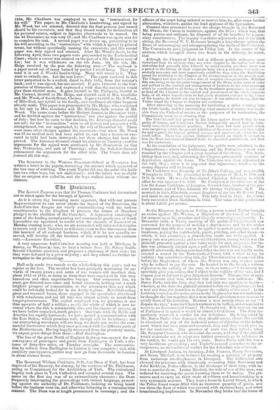gbe _Metropolis.
A correspondent of yesterday's Morning Chronicle announces the rumoured resignation of the Tory Member, Lord Teignmoath-
" For same days past a rumour has been in general circulation throughout the borough of Marylebone, that it is the intention of Lord Teignmouth, im- mediately on the reassembling of, Parliament, to resign his seat as Member for the borough and accept the Chiltern Hundreds. There are, no doubt, some good grounds for this rumour, as it is asserted that a special meeting of the Loyal and Constitutional Association took place on Wednesday week last, and that Sir James Cockburn, Mr. Paynter the barrister, and one or two other gentlemen, were to be the parties deputed to call upon his Lordship to resign when they conceive the Conservatives sufficiently prepared for an election. In the event of this taking place, Mr. Bond Cabbell will be the candidate. Is there no good Reformer to be found to oppose him ?"
On Saturday last, the twenty-seventh anniversary of the Artists General Benevolent Institution was celebrated by a public dinner at the Freemasons Tavern. Lord Monteagle was in the chair, and a con- siderable number of the supporters of the institution were present on the occasion. The Chairman, in the course of the evening, made an energetic appeal to the company in favour of the institution, and the result was a subscription amounting to 5541.
On Saturday, at the meeting of the Marylebone Vestry, Lord Nugent brought forward a motion of which he had given notice for an address praying the Queen to throw the entire of the Regent's Park open to the public. The Reverend Doctor Fellows seconded the motion ; which was unanimously adopted; and the mover and seconder, with the Mem- bers for the borough, were requested to form a deputation to present the address.
On Monday, a meeting of merchants andmthers connected with New South Wales was held, at the George and Vulture Tavern, to take into consideration regulations lately issued by the Commissioners for Colo- nial Lands and Emigration, " for the information of persons sending out emigrants on bounty to New South Wales or Van Diemen's Land." Mr. Baldwin, M.P. took the chair. Mr. Marshall gave an account of the Government and Bounty Systems of emigration ; quoting the report of the Emigration Committee of the Legislative Council of New South Wales to show that the Bounty system was the better. He contended that the regulations of the Commissioners would prevent emigration from being carried on under the Bounty system. A series of resolu- tions was unanimously adopted by the meeting, pledging it to the re- sistance of the regulations ; appointing a Committee to communicate with the Secretary of State, and if that were not found sufficient, to bring the matter before Parliament'; and expressing a hope that in the mean time the regulations would be suspended.
The great case of Wood and others versus Goofflake and others came on for argument before the Judicial Committee of the Privy Council on Tuesday. The Lords present were Lord Langdale, Lord Lyndhurst, the Vice-Chancellor, Mr. Justice Parke, and Sir J. Littledale. About sixteen counsel were present. The Attorney-General stated the case for the appellant, Sir Matthew Wood. At a former meeting of the Committee, objection had been taken to Dr. Lushington's sitting with the Committee, because he had previously been engaged as an advocate for the appellants ; and he withdrew. The Attorney- General now produced precedents to show why he need not have done so : the present Master of the Rolls adjudicated in a case in which he had appeared as counsel; Mr. Justice Patteson was concerned in another case, and signed the appeal by which it was carried before the House of Lords ; he was made a judge in the interval; and when he received a summons to sit upon the case in the House, he attempted to excuse himself on the ground of his having taken part in the case ; but his objection was overruled. Mr. James Wood, whose will gave rise to the present proceedings, was a very wealthy tradesman of Gloucester ; be was engaged in the three occupations of banker, linendraper, and undertaker. He was a bachelor ; and his household consisted of him- self, two maid• servants, a shopman, and an apprentice. lie was of very parsimonious habits : he slept in the same room with the two male members of his household, and all the family ate together. By such habits as these, the wealth which be had obtained by succession from his grandfather and father had been enormously increased, and at his death his personal estate amounted to 800,0001., and his real to about 100,0001. All his nearest relations were dead. Being old, some of his customers urged him to make his will; fearing the trouble to them- selves in the settlement of accounts should he die intestate. In defer- ence to them he did so. His four favourites at this time were—Mr. Os- born, who had been an apprentice of his, and had served him for forty years ; Mr. Surman, his cousin and also his apprentice ; Mr. Chadborn, a solicitor, who had ingratiated himself with Mr. Wood by never making law-charges ; and Sir Matthew Wood, of whose political con- duct he approved. During his lifetime, Mr. Wood made Sir Matthew, who was in no way related to him, a present of a house, and stood god- father to one of Sir Matthew's daughters. On the 2d December
1834, Mr. Chadborn was employed to draw up "instructions for his will." This paper, in Mr. Chadborn's handwriting, and signed by Mr. Wood, but not attested, directed that the four persons just named should be his executors, and that they should retain for themselves all his personal estates, subject to legacies afterwards to be named. On the 3d December, he was very ill ; and Mr. Chadborn was again sent for to complete his task. A second paper was drawn up, purporting to be his will according to the "instructions," with which it agreed in geheral terms, but without specifically naming the executors ; and this second paper was duly signed and attested. After Mr. Wood's death, in the following April, these two papers were propounded in the Ecclesiastical Court; where a caveat was entered on the part of a Mr. Helps as next of kin ; but it was withdrawn on the 4th June. On the 8th, Mr. Helps received by the post the following note—" The enclosed is a paper saved out of many burned by parties I could hang. They pre- tend it is not J. Wood's handwriting. Many will swear to it. They want to swindle me. Let the rest know." The paper enclosed in this letter purported to be a codicil, dated in July 1835, from the testator's bank ; and it was signed, but not attested. It gave 140,0001. to the Cor- poration of Gloucester, and expressed a wish that the executors would give them 60,0001. more. It gave 50,0001. to Mr. Phillpotts, 10,0001. to Mr. Cornsel, 30,0001. to Mr. Helps, and 20,0001. each to Mrs. Goodlake and Mr. Wood, of Smith Street, Chelsea. It gave 14,0001. to Mr. S. Wood, of Mile-End, and 6,0001. to his family, and confirmed all other bequests already made. This paper was propounded by Mr. Helps ; who was joined in his suit by Mrs. Goodlake and Mr. Hitchins, both cousins of Mr. Wood. The cause came before Sir Herbert Termer, in December 1838; and he decided against the " instructions," and also against the codicil of July : but how he came to that decision, the Attorney-General could not tell; for the " instructions " were to all intents and purposes a will, strengthened, but not supefseded, by the will of December 3d. There were some other charges against the executors—that when Mr. Wood was ill no medical man had been called in, and that a document exe- cuted in 1831 had been destroyed ; but these charges had been dis- proved. The Attorney -General closed his address on Tuesday ; and the arguments for the appeal were continued by Mr. Pemberton on that day, Wednesday, and part of Thursday ; when the Solicitor-General commenced the arguments for the other side. The Court then ad- journed till this day.
The Secretary to the Western Grammar-School at Bromptou has written a letter to the papers, correcting the account which appeared of the late case of stabbing. The youth Taylor did run the point of a knife into two other boys, but not maliciously ; and the injury was so slight that no surgeon was called in, and the boys walked home without as- sistance.



























 Previous page
Previous page